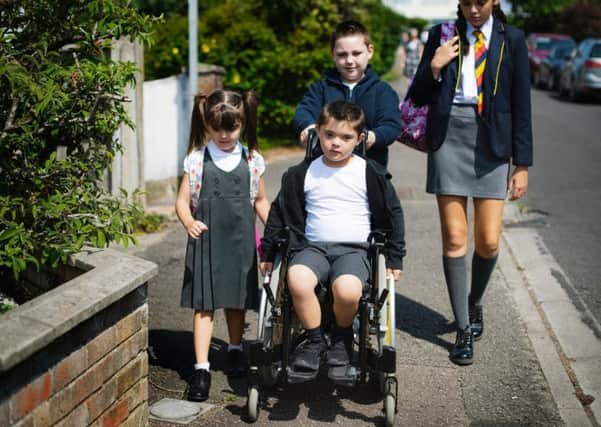Benefits for all if children with special needs are taught in mainstream schools - Jayne Dowle


These are the youngsters with special educational needs (SEN). At 16, they may not have had the opportunities others take for granted. They may have been literally forced into a special school by a system which does not treat them fairly and can blight their prospects without recourse.
A wide-reaching investigation by The Yorkshire Post and JPI Media has found that mainstream schools in England are now the least inclusive in the UK; nationally, the number of children with SEN in mainstream education in England has dropped by a quarter since 2012, while the number attending special schools has increased by nearly a third.
Advertisement
Hide AdAdvertisement
Hide Ad

It is even worse in Yorkshire where the proportion of mainstream secondary school pupils who have special needs across the region is now 12.5 per cent compared to 20.5 per cent in 2012.
Here in Barnsley, I’m pleased to say that both my children, who are now 13 and 17, have attended schools where they studied alongside SEN friends. For example, I was moved to tears by my son Jack’s GCSE drama group last year; an absolute study in inclusivity, proving beyond measure that not all skills and abilities can be measured on an exam paper.
And I remember with great fondness my daughter’s primary school classmate who I’ll call Alfie. From nursery up to Year Six, Lizzie and Alfie played together and went to each other’s parties.
Advertisement
Hide AdAdvertisement
Hide AdAs far as I ascertained, he had learning difficulties and some challenges with his speech. But Alfie could run around the playground with the rest of them and was the friendliest, most upfront little boy you could wish to meet.


As Lizzie grew older, she learned to appreciate Alfie and to understand the fact that sometimes he needed help grasping things in the classroom that she took for granted. I dare say that working alongside him taught her about difference and diversity and helped her learn, too – to respect other people, regardless of what they could, or couldn’t, do.
She’s lucky enough to find schoolwork relatively easy, but I would have hated her to become one of those cocky kids who breeze through life without a care for anyone else.
And for Alfie, too, the support and warmth he received at primary school clearly helped him to progress and gain confidence – and he had a one-on-one support worker, too. After Year Six, however, he moved to a special needs secondary school. I see him sometimes and he still says hello. I hope he is happy there.
Advertisement
Hide AdAdvertisement
Hide Ad

It is true, of course, that some young people do require the intensive intervention that only a ‘special school’ can offer. And it is right that this is given the care and investment it requires.
But it would seem that too many of our most vulnerable young people are being let down by an education system too focused on school performance and exam results.
Let’s be honest. I think we will all know of at least one school which has shuttled off pupils who don’t fit the mould in order to massage performance measures. It’s immoral that this practice should be allowed to proliferate, holding our most vulnerable of young people to ransom.
Advertisement
Hide AdAdvertisement
Hide AdThe Alliance for Inclusive Education (ALLFIE) says mainstream education no longer has the money or support to facilitate proper assessment and integration, leaving parents with no choice other than special schools.


Imagine the difficulty of knowing that your child has been labelled for life, when there was always a chance that they would manage to stay and study alongside their friends and peers.
Yet Simone Aspis, policy and campaigns co-ordinator at ALLFIE, says “parental choice is a myth” because families are forced into special school provision because “mainstream schools no longer have the money or support to implement inclusive education practice”.
Advertisement
Hide AdAdvertisement
Hide AdClearly, there should be a choice: Ministers would do well to consider this new research very seriously, take steps to reverse the trend highlighted by it and provide adequate funding to ensure that all SEN young people in our schools receive the necessary support and assistance.
Ms Apsis calls the current situation an “ongoing attack on disabled people’s rights to be included rather than segregated from society”.
In this she highlights a truth that should concern us all. Despite the protections provided by disability legislation, we’re turning back the clock rather than leaping forward when it comes to equality for disabled people.
Early perceptions matter and school plays such an important role. What kind of message are we sending to future generations if we allow the education system to proactively segregate and isolate SEN children from others?